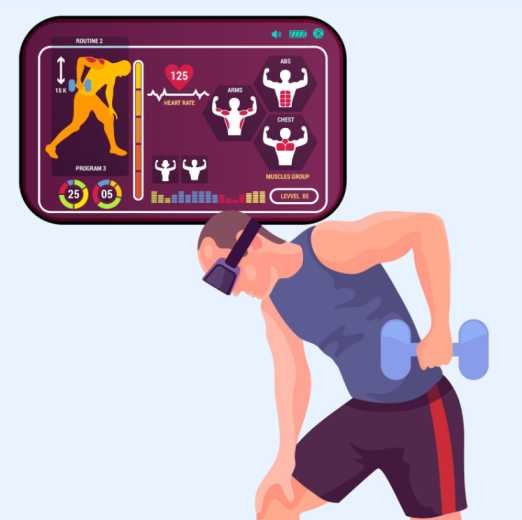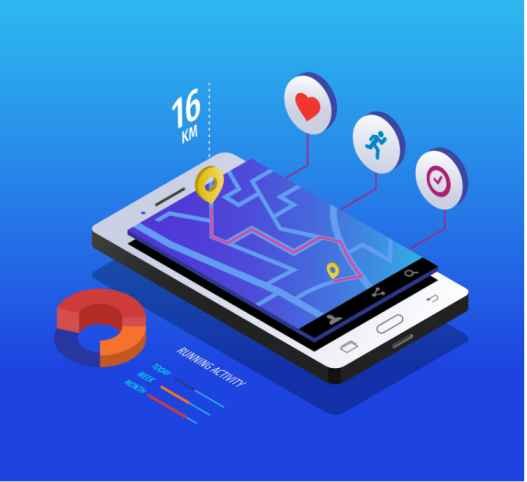Introduction
Mobile applications are essential for assisting people in achieving their fitness objectives in the fast-paced world we live in today when health and fitness are of utmost importance. The introduction of fitness applications, which provide convenience, inspiration, and individualized experiences, has completely changed how people think about exercise and wellness. A fitness app developer understands the nuances of designing an app that caters to diverse fitness goals and user preferences. It’s critical to comprehend the salient characteristics and advantages that contribute to the success of a fitness app if you’re thinking about producing one. We will discuss the key components and numerous benefits of developing a successful fitness app in this blog post.
Key Components of Fitness App
Customizable Workouts and Training Plans
Offering personalized workouts and training regimens is one of a fitness app’s most important features. Users’ fitness levels, interests, and objectives differ. Users should be able to customize their workouts using effective software, whether they want to lose weight, grow muscle, or just get more active. Users will feel in control and be able to design a custom workout regimen thanks to the presence of a variety of exercises, difficulty levels, and time options.
Tracking and Progress Monitoring
Fitness followers value being able to monitor their development and get noticeable benefits. Users may track their progress and maintain motivation by using the app’s tracking capabilities, which include step counts, heart rate monitors, and calorie counters. The software may show users their progress through statistics, graphs, and achievements. This gives users a sense of success and motivates them to keep going.
Nutrition and Meal Planning
An effective fitness app should not only emphasize physical activity but also provide advice on diet and meal preparation. Users’ fitness journeys can be greatly improved by integrating a nutrition element that offers them nutritious meal selections, calorie tracking, and customized diet plans. Users can acquire a balanced approach to their general well-being and greater results by mixing exercise and nutrition.
Integration with Telemedicine and Wellness Services
Fitness mobile app developers are playing a vital role in the integration of health and wellness services into mobile applications. These developers create and design fitness apps that allow users to track their physical activity, monitor their nutrition, and set personalized fitness goals. With the integration of medical and mental health services, app developers are now enabling users to take a more holistic approach to their well-being. By partnering with medical professionals, dietitians, and mental health specialists, app developers are helping users achieve their wellness goals and live healthier lives.
Social Interaction and Community
Since humans are social creatures, social elements in fitness apps, developed by app developers, can be quite useful. Giving users the chance to communicate, brag about their accomplishments, and compete amicably promotes a sense of accountability. A friendly environment where users may encourage and inspire one another can be created by features like challenges, leaderboards, and the ability to connect with friends or trainers, ultimately enhancing users’ adherence to fitness goals. By collaborating with fitness app developers, app creators can ensure that these social elements are effectively integrated into their platforms.
Integration with Wearable Devices
Integrating your fitness app with these gadgets, developed by experienced fitness app developers, can give users a smooth experience given the rising popularity of wearable technology such as fitness trackers and smartwatches. Users may seamlessly sync their data with popular wearable devices, see their progress in real time, and get personalized advice based on their fitness parameters. This connection, developed by skilled on-demand fitness app developers, improves user interaction while giving them precise, detailed information about their exercises and general health.
Benefits of Building a Successful Fitness App
Building a profitable fitness app can have a lot of advantages for both consumers and app developers, including fitness app developers. Users can appreciate the ease of having a personal trainer on their phone, having access to custom routines, and being able to quickly track their advancement. Additionally, they may feel more motivated, and fitter, and live a healthier lifestyle. For developers, creating a popular fitness software offers a rewarding business opportunity with the potential for high user engagement, profitability through subscriptions or in-app purchases, and the opportunity to have a beneficial impact on people’s lives.
Convenience:
Fitness apps bring the gym to users’ fingertips, eliminating the need to commute and allowing them to exercise anytime, anywhere. This convenience increases the likelihood of users sticking to their fitness routines, even in the busiest of schedules.
Personalization:
By offering customized workouts, tracking features, and nutrition guidance, fitness apps, developed by skilled fitness app developers, provide a personalized experience to every user. This individualized approach caters to diverse fitness levels and goals, ensuring that users feel motivated and engaged. These developers utilize their expertise to create user-friendly interfaces, innovative features, and seamless integration with wearable devices, making it easier for individuals to monitor their progress and stay committed to their fitness journey.
Motivation and Accountability:
Fitness apps offer built-in motivation through progress tracking, goal setting, and reminders. Push notifications and alerts can encourage users to stay consistent and hold themselves accountable for their fitness journey.
Access to Expertise:
A successful fitness app can provide access to professional trainers, nutritionists, and wellness experts. This access enables users to receive expert advice, learn proper techniques, and make informed decisions about their fitness and nutrition goals.
Increased Revenue
The fitness industry is growing rapidly, and the demand for fitness apps is also on the rise. Building a successful fitness app can help you tap into this lucrative market and generate significant revenue.
Increased Customer Engagement
A successful fitness app, developed by a skilled fitness app developer, can help you engage with your customers and build a loyal following. Regular updates, personalized experiences, and social features, carefully crafted by the developer, can keep users engaged and motivated, leading to increased customer satisfaction.
Improved Brand Recognition
Building a successful fitness app with the help of a skilled fitness app developer can also help improve your brand recognition. As more people use your app and share their progress on social media, your brand will gain visibility and credibility. Collaborating with a dedicated fitness app developer can ensure that your app is designed and optimized for a seamless user experience, enhancing its appeal and usability. A successful fitness app, developed in collaboration with experts, can also help you differentiate your brand from competitors and establish yourself as a leader in the industry.
Improved Customer Retention
A successful fitness app can help you retain customers by providing a valuable and engaging experience. Regular updates, new features, and personalized experiences can keep users coming back to your app, reducing churn and improving customer retention.
Improved Health and Wellness
Ultimately, the most significant benefit of building a successful fitness app, as a fitness app developer, is improving the health and wellness of your users. A successful fitness app can help users achieve their fitness goals, stay motivated, and maintain a healthy lifestyle. You can make a beneficial effect on people’s lives and the planet by using your expertise as a fitness software developer and offering a user-friendly interface with features like workout tracking, nutrition advice, and customized training regimens.
Key Challenges of Building a Successful Fitness App:
Competition:
One of the biggest challenges of building a successful fitness app is competition. The fitness app market is crowded, and there are many established players in the market. Businesses must come up with a unique value proposition to differentiate their app from the competition.
User Retention:
The second challenge of building a successful fitness app is user retention. Many users download fitness apps, but only a small percentage of them continue to use the app after the first few weeks. Businesses must provide users with a seamless user experience and engaging content to keep them coming back to the app.
Personalization:
The third challenge of building a successful fitness app is personalization. Fitness goals and fitness levels vary from person to person, and businesses must provide personalized workout and nutrition plans to each user. Fitness app developers and businesses must collaborate to use data analytics and machine learning algorithms effectively in order to provide customized content tailored to the specific needs and preferences of each user. By leveraging the expertise of custom fitness and health app developers, businesses can create dynamic and interactive platforms that adapt to individual users, offering them the most relevant and effective fitness guidance and resources.
Data Security and Privacy:
Data security and privacy are the fourth challenges of building a successful fitness app. Fitness apps collect a lot of personal data from users, including their health and fitness data. Businesses must ensure that the data is secure and comply with data protection regulations.
Technical Challenges:
The fifth challenge of building a successful fitness app is technical challenges. Fitness apps require integration with various technologies such as wearables, fitness trackers, and health sensors. Businesses must have the technical expertise to build and maintain the app.
Platform Compatibility:
Building a fitness app that runs smoothly across multiple platforms, such as iOS and Android, can be challenging. The app must be optimized for various screen sizes, operating systems, and device capabilities. Working with a skilled fitness app development company that understands the intricacies of platform-specific requirements and can implement responsive design techniques is crucial. Testing the app thoroughly on different platforms is essential to deliver a consistent and reliable experience to users.
Content Creation and Maintenance:
To keep users engaged, fitness apps need to regularly update their content with new exercises, workout routines, and challenges. This requires a dedicated team of fitness experts, content creators, and developers. Creating a sustainable content creation and maintenance strategy is crucial.
Conclusion
In conclusion, building a successful fitness app requires careful planning, attention to user needs, and the integration of essential features. By incorporating features such as personalized workout plans, goal tracking, community engagement, and data analysis, you can create an app that stands out in the competitive fitness market. Remember to prioritize user experience, provide valuable content, and continuously adapt and improve based on user feedback.































































